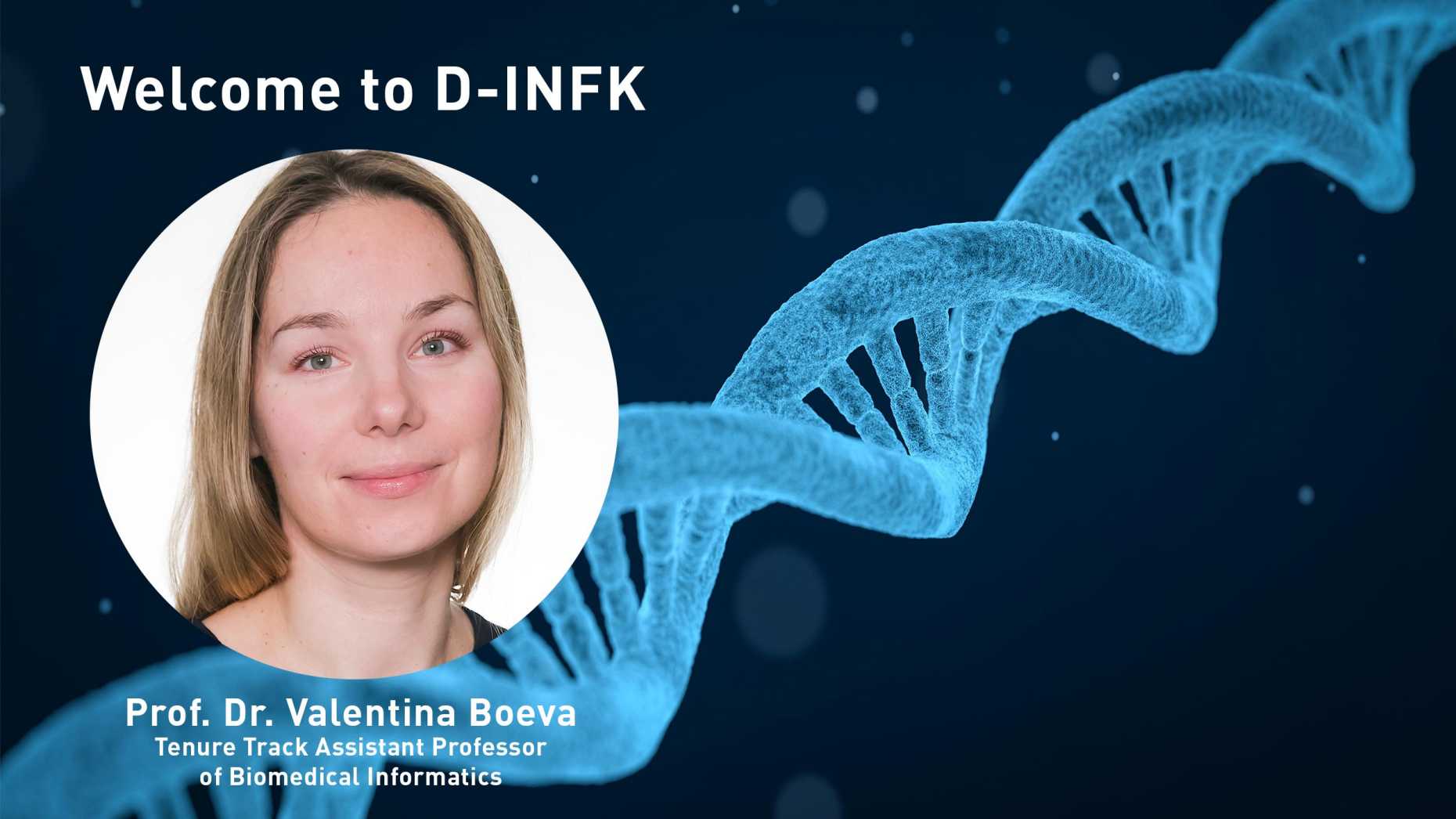Welcome, Professor Valentina Boeva!
27.06.2019 | Anna Ettlin
Professor Valentina Boeva officially joined the Department of Computer Science of ETH Zurich in early June 2019 as Tenure Track Assistant Professor of Biomedical Informatics. Get to know her in this short interview.

Professor Boeva, welcome to ETH! What are your current research interests?
My research focuses on understanding the molecular processes that lead to the aggressive behaviour of cancer cells: in other words, how genetic and, specifically, epigenetic changes help cancer cells resist cell death, avoid immune surveillance and invade neighbouring tissues. While there has been a lot of progress in this area from a purely molecular biology approach, the recent paradigm shift towards advanced data analytics (in particular machine learning algorithms) has enabled us to identify biological patterns and get a far greater understanding of these phenomena than we were previously able to achieve. The application of these methods, arising from advancements in next-generation sequencing and the wider availability of raw data, is complemented by the progress in computational capabilities. This is the foundation that biomedical informatics is built on, and being a young but rapidly growing field, there is a lot of potential for its application towards defining the molecular processes that drive cancer.
Within the field of biomedical informatics, I have chosen to focus on understanding the role of epigenetic cancer drivers; i.e. how changes in the 3D structure of the DNA (versus the DNA sequence itself) and molecular signposts along the DNA (epigenetic marks) affect cancer development. On the functional level, this also includes understanding the link between genomic aberrations and epigenetic changes. The ultimate goal is to help clinicians make treatment choices for cancer patients based on genomic, epigenetic, transcriptomic and other information. Moreover, we not only aim to contribute to clinical decisions, we also develop computational approaches that are now being used by research and clinical teams all over the world to process multi-omics information [1]. For instance, we created a classifier to stratify stage 4 neuroblastoma patients into a medium risk group – to receive the standard treatment – and an ultrahigh risk group – to be included in clinical trials. Standard treatment in patients classified as belonging to the ultrahigh risk group was predicted to be predominantly ineffective in about 95% of cases, and a different type of therapy would be required [2].
What is the impact of your research on society?
Cancer is one of the primary causes of mortality in the modern world, killing some 8 million people across the globe every year. What leads to its prevalence is the complexity and diversity of the disease. However, there has been a lot of progress in recent years in areas such as diagnosis, prognosis and treatment. This is likely to accelerate in the near future, in part thanks to the new algorithms and computational techniques being developed. I feel honoured to be able to participate in this research, especially as the field I am working in is relatively new, and our work is shaping it for generations to come.
Where were you working before you came to ETH?
For the last three years, I have been group leader of the laboratory of Computational Epigenetics of Cancer at Inserm, located at the Cochin Institute in Paris [3]. The Cochin Institute focuses on biomedical research and includes about 30 research teams working in cancer, immunology, embryological development, and reproduction. The institute also has very strong links with clinicians. Before joining the Cochin Institute, I worked for about seven years at the Curie Institute in Paris (the leading French institute in cancer treatment and research).
Which courses will you be teaching at ETH?
I am working on this right now! I want to contribute to a programme in computational biology and bioinformatics with a focus on machine learning that would appeal to ‘outsiders’ from the fields of computer science, applied mathematics or even physics and engineering. Stay tuned!
What are your first impressions of Switzerland and ETH?
I used to come to Zurich quite frequently before working at ETH and always admired the curious combination of tradition and innovation, which are in the spirit of this country. It also appears to me that living in close proximity to the Alps (my absolute favourite!) inspires people to take good care of nature. It is no wonder that Switzerland is leading in such areas as green energy, waste reduction and sustainable transportation. This is just one of the many great qualities of the people here in Zurich that I have a high regard for.
That being said, coming to a new country is never an easy task, and the support from ETH has been extraordinary. I feel very welcome here, whether it be by the many people who volunteered to help get me settled, the office for faculty affairs or the local support from people in the department.
What advice would you give to students who are just starting out in computer science?
I suggest focusing on gaining fundamental knowledge of mathematics and computer science, but also keeping an eye on the current trends (e.g. AI in 2019) to be more successful on the job market. Whenever possible during your studies, apply the methods learned to real-life problems and start to get a feel of what area you want to work in. It is important to love what you do, as the motivation will carry you through your career.